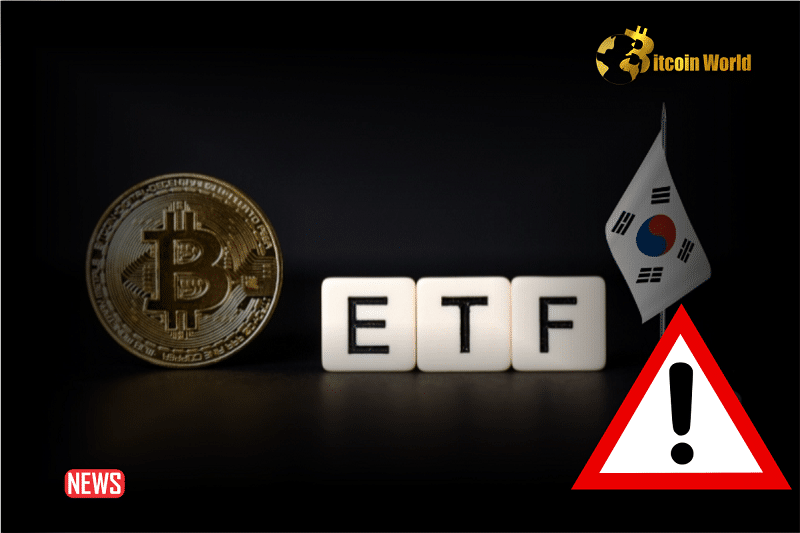Are you keeping tabs on the global crypto ETF race? While the US has already given the green light to spot Bitcoin ETFs, the situation in Asia is proving to be a fascinating mix of caution and potential breakthroughs. Let’s dive into the latest developments from South Korea, a nation known for its tech-savvy population and vibrant crypto scene.
South Korea Reconsiders Spot Bitcoin ETFs: What’s the Buzz?
Hold on to your hats, crypto enthusiasts! There’s a shift in the air in South Korea. The presidential office has stepped in, urging the country’s Financial Services Commission (FSC) to take another look at spot Bitcoin ETFs. This comes as a bit of a surprise because the FSC previously seemed hesitant, even warning local firms against brokering foreign-listed Bitcoin spot ETFs, citing potential violations of capital market laws. This move led to major securities companies in South Korea pausing trading of existing foreign spot Bitcoin ETFs.
But now, the tide might be turning. Sung Tae-yoon, a key policy advisor in the presidential office, hinted at a potential shift. He mentioned the government is exploring ways to integrate international standards into local regulations. Could this be a signal that South Korea is warming up to the idea of launching its own spot crypto ETFs? Local news sources like Maeil Business seem to think so!
Why the Change of Heart?
It’s a bit of a head-scratcher, isn’t it? Why would the presidential office intervene now? Here’s what we can deduce:
- Global Pressure & Trend: The successful launch of spot Bitcoin ETFs in the US has undoubtedly put pressure on other nations to consider similar products. South Korea might be feeling the need to stay competitive in the global digital asset landscape.
- Investor Demand: South Koreans are known for their keen interest in crypto. There’s likely significant demand for regulated and accessible Bitcoin investment vehicles like ETFs. Ignoring this demand could push investors to less regulated or overseas options.
- Economic Growth Potential: Embracing crypto ETFs could be seen as a way to boost the financial sector and attract investment into South Korea.
Potential Hurdles: What’s Still in the Way?
Despite the presidential office’s nudge, it’s not a done deal yet. The FSC initially raised concerns about capital market laws. These concerns likely revolve around:
- Market Volatility: Bitcoin’s price swings are notorious. Regulators are naturally cautious about offering products linked to such a volatile asset to retail investors.
- Investor Protection: Ensuring adequate investor protection in the crypto space is a primary concern for regulators worldwide.
- Regulatory Framework: South Korea needs to establish a clear and robust regulatory framework for spot crypto ETFs to operate within the local legal landscape.
See Also: Singapore Regulators Reject Bitcoin ETF’s Citing High Risk
Asia’s Crypto ETF Landscape: A Region of Contrasts
South Korea’s situation is just one piece of the puzzle in Asia’s evolving crypto ETF story. Let’s take a quick look at what’s happening in other key Asian hubs:
Singapore and Thailand: Taking a Pass (For Now)
While South Korea is reconsidering, some of its neighbors are taking a more cautious approach. Singapore, often considered a forward-thinking financial center, has stated that spot Bitcoin ETFs are not currently on the cards for retail investors. The Monetary Authority of Singapore (MAS) told CNA that these products are deemed too risky for the average investor.
Thailand’s Securities and Exchange Commission (SEC) echoes this sentiment. As reported by the Bangkok Post, they have no plans to approve local spot Bitcoin ETFs either.
Hong Kong: Asia’s Next Crypto ETF Hub?
Interestingly, Hong Kong is emerging as a potential leader in Asian spot crypto ETFs. Their financial regulators have been proactively laying the groundwork, issuing circulars in December outlining the requirements for these products.
Livio Weng, COO of Hong Kong-based crypto exchange HashKey, believes Hong Kong could be the next Asian hub to launch spot crypto ETFs. He mentioned that around 10 fund managers, some with Chinese backing, are exploring this possibility. This could position Hong Kong as a key gateway for crypto investment in the region.
Key Takeaways: What Does This Mean for Crypto Investors?
- South Korea’s stance is evolving: The presidential office’s intervention suggests a potential shift towards a more crypto-friendly regulatory environment. Keep a close watch on the FSC’s response.
- Asia is a mixed bag: Different Asian nations are taking diverse approaches to crypto ETFs, reflecting varying risk appetites and regulatory priorities.
- Hong Kong is one to watch: If Hong Kong successfully launches spot crypto ETFs, it could significantly influence the regional crypto market and potentially push other nations to follow suit.
- Regulatory clarity is crucial: For spot Bitcoin ETFs to become widely available in Asia, clear and robust regulatory frameworks are essential to address concerns and protect investors.
The Road Ahead
The situation in South Korea is a developing story. The coming weeks and months will be crucial in determining whether the presidential office’s push will translate into a policy change. If South Korea does eventually approve spot Bitcoin ETFs, it would be a significant win for the crypto industry in Asia and could pave the way for wider adoption of these investment products across the region.
For crypto investors, this is a space to watch closely. The decisions made by South Korea and other Asian nations will have a significant impact on the accessibility and mainstream acceptance of cryptocurrency investments globally.
Disclaimer: The information provided is not trading advice. Bitcoinworld.co.in holds no liability for any investments made based on the information provided on this page. We strongly recommend independent research and/or consultation with a qualified professional before making any investment decisions.
Disclaimer: The information provided is not trading advice, Bitcoinworld.co.in holds no liability for any investments made based on the information provided on this page. We strongly recommend independent research and/or consultation with a qualified professional before making any investment decisions.


